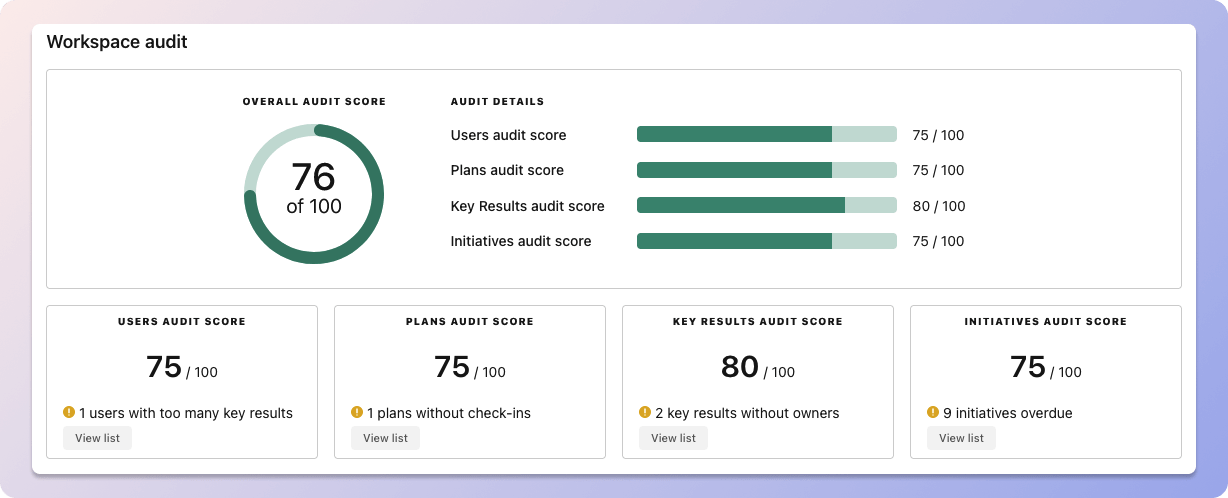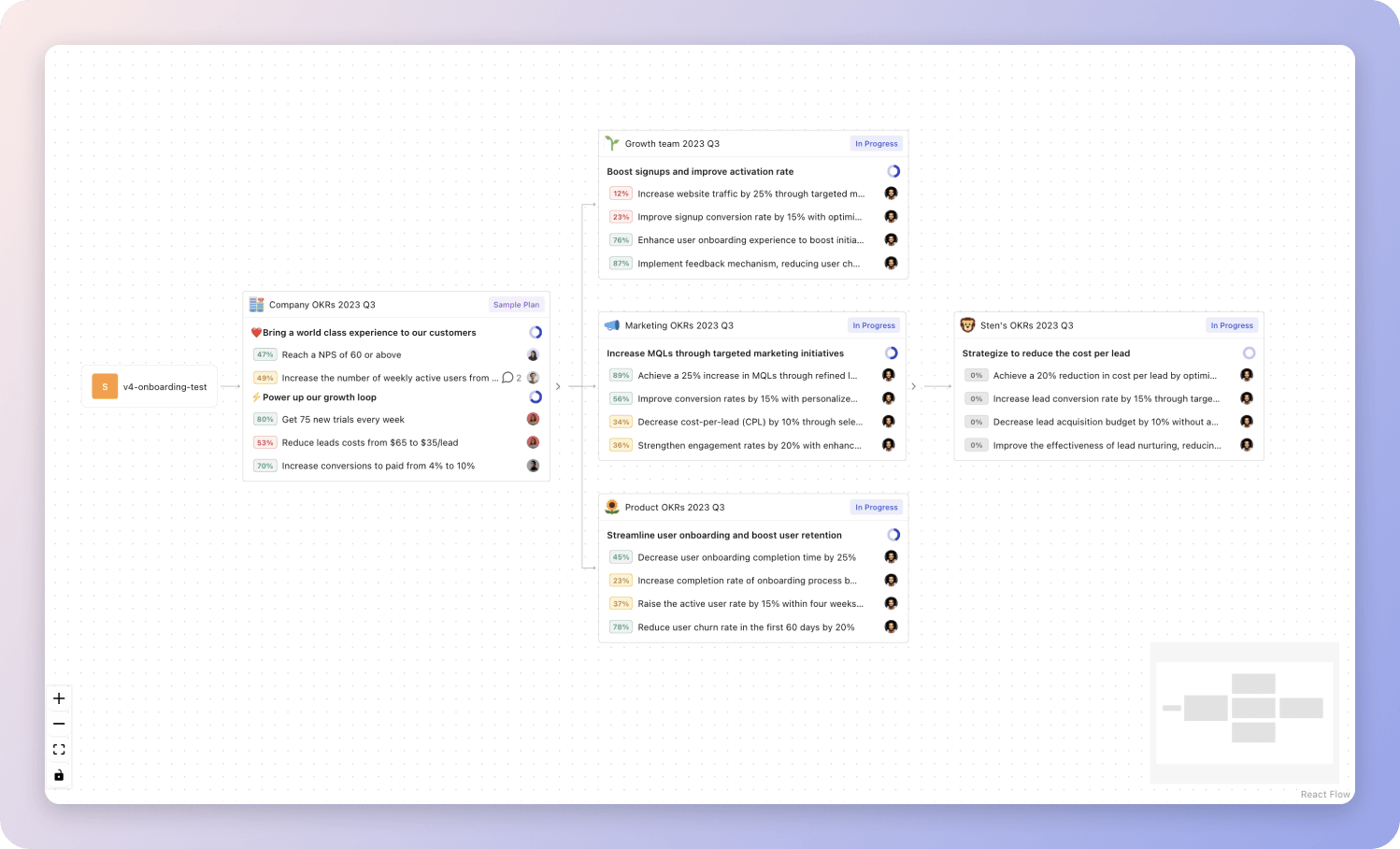5 OKR examples for Mobile App Development Team
What are Mobile App Development Team OKRs?
The Objective and Key Results (OKR) framework is a simple goal-setting methodology that was introduced at Intel by Andy Grove in the 70s. It became popular after John Doerr introduced it to Google in the 90s, and it's now used by teams of all sizes to set and track ambitious goals at scale.
Creating impactful OKRs can be a daunting task, especially for newcomers. Shifting your focus from projects to outcomes is key to successful planning.
We have curated a selection of OKR examples specifically for Mobile App Development Team to assist you. Feel free to explore the templates below for inspiration in setting your own goals.
If you want to learn more about the framework, you can read more about the OKR meaning online.
Best practices for managing your Mobile App Development Team OKRs
Generally speaking, your objectives should be ambitious yet achievable, and your key results should be measurable and time-bound (using the SMART framework can be helpful). It is also recommended to list strategic initiatives under your key results, as it'll help you avoid the common mistake of listing projects in your KRs.
Here are a couple of best practices extracted from our OKR implementation guide 👇
Tip #1: Limit the number of key results
The #1 role of OKRs is to help you and your team focus on what really matters. Business-as-usual activities will still be happening, but you do not need to track your entire roadmap in the OKRs.
We recommend having 3-4 objectives, and 3-4 key results per objective. A platform like Tability can run audits on your data to help you identify the plans that have too many goals.
 Tability's audit dashboard will highlight opportunities to improve OKRs
Tability's audit dashboard will highlight opportunities to improve OKRsTip #2: Commit to the weekly check-ins
Don't fall into the set-and-forget trap. It is important to adopt a weekly check-in process to get the full value of your OKRs and make your strategy agile – otherwise this is nothing more than a reporting exercise.
Being able to see trends for your key results will also keep yourself honest.
 Tability's check-ins will save you hours and increase transparency
Tability's check-ins will save you hours and increase transparencyTip #3: No more than 2 yellow statuses in a row
Yes, this is another tip for goal-tracking instead of goal-setting (but you'll get plenty of OKR examples below). But, once you have your goals defined, it will be your ability to keep the right sense of urgency that will make the difference.
As a rule of thumb, it's best to avoid having more than 2 yellow/at risk statuses in a row.
Make a call on the 3rd update. You should be either back on track, or off track. This sounds harsh but it's the best way to signal risks early enough to fix things.
Building your own Mobile App Development Team OKRs with AI
While we have some examples below, it's likely that you'll have specific scenarios that aren't covered here. There are 2 options available to you.
- Use our free OKRs generator
- Use Tability, a complete platform to set and track OKRs and initiatives
- including a GPT-4 powered goal generator
Best way to track your Mobile App Development Team OKRs
Quarterly OKRs should have weekly updates to get all the benefits from the framework. Reviewing progress periodically has several advantages:
- It brings the goals back to the top of the mind
- It will highlight poorly set OKRs
- It will surface execution risks
- It improves transparency and accountability
Spreadsheets are enough to get started. Then, once you need to scale you can use a proper OKR platform to make things easier.
 Tability's Strategy Map makes it easy to see all your org's OKRs
Tability's Strategy Map makes it easy to see all your org's OKRsIf you're not yet set on a tool, you can check out the 5 best OKR tracking templates guide to find the best way to monitor progress during the quarter.
Mobile App Development Team OKRs templates
We've covered most of the things that you need to know about setting good OKRs and tracking them effectively. It's now time to give you a series of templates that you can use for inspiration!
You will find in the next section many different Mobile App Development Team Objectives and Key Results. We've included strategic initiatives in our templates to give you a better idea of the different between the key results (how we measure progress), and the initiatives (what we do to achieve the results).
Hope you'll find this helpful!
OKRs to improve mobile app reusability throughout the organization
Improve mobile app reusability throughout the organization
Conduct training for 100% of developers on efficient app component reusability practices
Develop a comprehensive reusability practices training program
Monitor and evaluate the training's effectiveness
Schedule training sessions for all developers
Reduce app feature duplication by 80% through consolidation efforts
Implement the consolidation plan in the app
Create a concise plan for feature consolidation
Identify features with duplication in the app
Implement shared framework to universalize 75% of mobile app functionalities
Integrate framework into 75% of mobile apps
Develop a shared framework integrating these commonalities
Identify common functionalities across existing mobile apps
OKRs to enhance app performance for a smoother user experience
Improve app performance and user experience
Increase app responsiveness by optimizing code and improving server speed
Decrease crash rate by 15% through bug fixing and testing
Achieve at least 4-star rating and positive feedback in app stores
Reduce app loading time by 20%
OKRs to mobile and QR code integration
OKRs to launch the mobile app for health professionals successfully
Launch the mobile app for health professionals successfully
Generate a minimum of 100 monthly active users
Develop engaging content and regular updates to drive user engagement
Collaborate with influencers or industry experts to promote the platform to larger audiences
Implement targeted marketing campaigns to reach new potential users
Optimize website for better user experience and faster loading times
Increase user sign-ups by 30%
Obtain positive feedback from at least 80% of app beta testers
Achieve a 4-star rating or higher on app stores
Encourage satisfied users to leave positive reviews by offering incentives or reminders
Improve user experience by streamlining app features and enhancing user interface
Implement a strong app store optimization strategy for improved app discoverability
Respond promptly to user feedback and address any reported issues or concerns
OKRs to develop a unified platform for third-party data delivery to mobile apps
Develop a unified platform for third-party data delivery to mobile apps
Enable integration of the platform with 5 different third-party data sources
Identify 5 third-party data sources relevant to the platform
Test and troubleshoot all data integrations
Build API connectors for each data source
Design and prototype the platform's functionality by testing with 3 mobile apps
Develop prototype incorporating these designs
Test prototype with 3 mobile apps
Sketch designs for the platform's functionality
Achieve a user satisfaction rating of above 85% after the platform is launched
Quickly resolve any reported user issues
Conduct regular feedback surveys with users
Implement a user-friendly design for the platform
More Mobile App Development Team OKR templates
We have more templates to help you draft your team goals and OKRs.
OKRs to to implement a strategic, consistent, and realistic social media approach
OKRs to secure the buy-in from the leadership of the 5 MAYD clusters on our strategy
OKRs to implement automation for processing work intake forms
OKRs to successfully launch 20 e-services online
OKRs to increase market penetration for DTC products
OKRs to successfully implement a new importer tool
OKRs resources
Here are a list of resources to help you adopt the Objectives and Key Results framework.
- To learn: Complete 2024 OKR cheat sheet
- Blog posts: ODT Blog
- Success metrics: KPIs examples